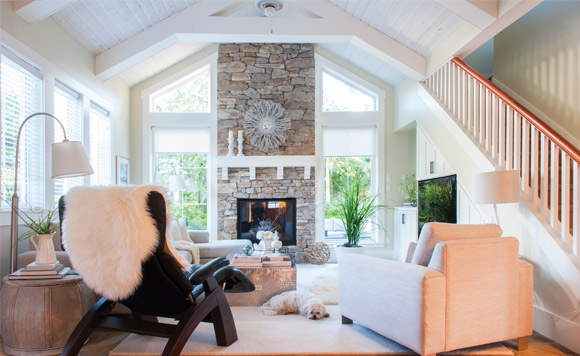by Dan Adair, Island Savings Brentwood Bay –
It’s hard to turn on the TV nowadays without getting roped into the latest and greatest renovation show. These shows usually leave us with grandiose ideas on how to make our homes look incredible while adding to the value of the home. Although the shows make it look very easy, profitable and quick, they can be anything but. Before you pick up a hammer and a bucket of paint, you should do some research to ensure that the repairs you are undertaking make sense. Maybe you are renovating your home because you plan on living there for a while, or because you think it’s a good investment. Whatever your reason, here are some tips to ensure that you maximize the value (financial and emotional) of your renovations.
Financial Aspects
How are you going to pay for any home improvements? There are numerous ways to fund a renovation, but an important question to ask before starting is whether you can afford it. Evaluate your savings and your reasons for the improvements. If it isn’t in the cards right now, maybe it’s in your best interest to wait until you’ve been able to save up more to fund the project.
Personal loan. A personal loan involves borrowing a specific amount from a financial institution and repaying it in regular payments over a set period of time. A personal loan will typically have a lower interest rate than a credit card, but if you need to borrow more funds, you will need to reapply.
Personal line of credit. This is a good option for long-term projects. Funds are accessible when you need them, and you only pay interest on the amount you use. Interest rates for a personal line of credit are lower than on a credit card and, unlike a personal loan, a line of credit lets you re-borrow funds, up to the line of credit’s limit, without reapplying.
Secured line of credit and home equity loan. These offer all the advantages of regular lines of credit and loans and come with preferred interest rates. Since they’re secured by your home’s equity, they are subject to set-up costs including legal fees. A home appraisal may also be required.
Rebates. Depending on the renovation, there may be government cash incentives available; for example, if your renovation helps make your house more energy efficient. Check out your utility provider or government website to see what incentives are available.
TIP: Avoid using a credit card for major renovation costs. The interest rates are high and if you can’t make the payment in full, this could add a significant amount to your expenses. If you are using it for smaller expenses, that is fine, so long as you pay it off in full at the end of the month.
Renovations That Make Sense
Canadians are spending close to $11,000 annually on renovations, but they are not all equal in terms of their returns. According to the Appraisal Institute of Canada (AIC), at right are the most valuable and the least valuable renovations.
Some upgrades that don’t add much value include costly landscaping (25 to 50% recovery rate); spa-style shower systems (36% recovery rate); and swimming pool (0 to 25% recovery rate).
Sometimes the reasoning for the renovation isn’t always investment based, but rather we undertake improvements to better our quality of life. According to AIC, here are the five renovations with the
highest enjoyment value.
• Basement finishing
• Garages
• Sun rooms / Additions
• Decks / Fences
• Landscaping
TIP: Decluttering can also be an easy way to increase the value of your home if you are trying to sell.
Know Your Limits
DIY is great, but if you aren’t exactly Mike Holmes maybe you should take care of the painting and leave the electrical work to the pros. Quality (and safety) are very important when it comes to renovations. Cutting a few corners to save a small amount could end up costing you in the long run.
Beauty is in the Eye of the Beholder
“I think hot pink is an excellent paint choice.” If this thought has crossed your mind and you are planning on living in your house forever, no problem, go to town. If you are hoping to attract a potential buyer, perhaps a more neutral colour will work better. Remember that not everyone has the same taste as you, so it is best to stay safe aestecially when you’re undertaking home improvements.
If you’re considering a home renovation, it’s a great idea to connect with your financial advisor first. They can help you establish a budget and set a plan in place to ensure that you stay on track financially.
Dan Adair is the Brentwood Bay branch manager at Island Savings, a division of First West Credit Union.




